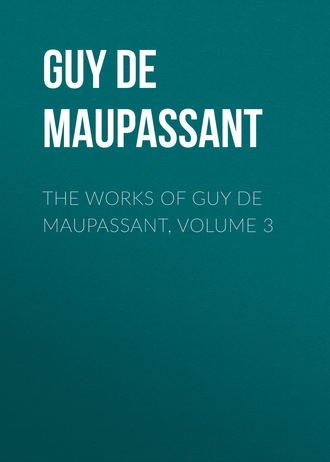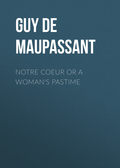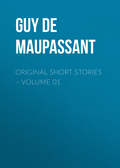
Ги де Мопассан
The Works of Guy de Maupassant, Volume 3
JEROBOAM
Anyone who said, or even insinuated, that the Reverend William Greenfield, Vicar of St. Sampson's, Tottenham, did not make his wife Anna perfectly happy, would certainly have been very malicious. In their twelve years of married life, he had honored her with twelve children, and could anybody decently ask anything more of a saintly man?
Saintly to heroism in truth! For his wife Anna, who was endowed with invaluable virtues, which made her a model among wives and a paragon among mothers, had not been equally endowed physically, for, in one word, she was hideous. Her hair, which was coarse though it was thin, was the color of the national half-and-half, but of thick half-and-half which looked as if it had been already swallowed several times, and her complexion, which was muddy and pimply, looked as if it were covered with sand mixed with brickdust. Her teeth, which were long and protruding, seemed as if they were about to start out of their sockets in order to escape from that mouth with scarcely any lips, whose sulphurous breath had turned them yellow. They were evidently suffering from bile.
Her china-blue eyes looked vaguely, one very much to the right and the other very much to the left, with a divergent and frightened squint; no doubt in order that they might not see her nose, of which they felt ashamed. And they were quite right! Thin, soft, long, pendant, sallow, and ending in a violet knob, it irresistibly reminded those who saw it of something which cannot be mentioned except in a medical treatise. Her body, through the inconceivable irony of nature, was at the same time thin and flabby, wooden and chubby, without having either the elegance of slimness or the rounded gracefulness of stoutness. It might have been taken for a body which had formerly been adipose, but which had now grown thin, while the covering had remained floating on the framework.
She was evidently nothing but skin and bones, but then she had too many bones and too little skin.
It will be seen that the reverend gentleman had done his duty, his whole duty, more than his duty, in sacrificing a dozen times on this altar. Yes, a dozen times bravely and loyally! A dozen times, and his wife could not deny it nor dispute the number, because the children were there to prove it. A dozen times, and not one less!
And alas! not once more; and that was the reason why, in spite of appearances, Mrs. Anna Greenfield ventured to think, in the depths of her heart, that the Reverend William Greenfield, Vicar of St. Sampson's, Tottenham, had not made her perfectly happy; and she thought so all the more as, for four years now, she had been obliged to renounce all hope of that annual sacrifice, which was so easy and so fugitive formerly, but which had now fallen into disuse. In fact, at the birth of the twelfth child, the reverend gentleman had expressly said to her:
"God has greatly blessed our union, my dear Anna. We have reached the sacred number of the twelve tribes of Israel, and were we now to persevere in the works of the flesh, it would be mere debauchery, and I cannot suppose that you would wish me to end my exemplary life in lustful practices."
His wife blushed and looked down, and the holy man, with the legitimate pride of virtue which is its own reward, audibly thanked Heaven that he was "not as other men are."
A model among wives and the paragon of mothers, Anna lived with him for four years on those terms, without complaining to anyone, and contented herself by praying fervently to God that He would mercifully inspire her husband with the desire to begin a second series of the twelve tribes. At times even, in order to make her prayers more efficacious, she tried to compass that end by culinary means. She spared no pains, and gorged the reverend gentleman with highly-seasoned dishes. Hare soup, ox-tails stewed in sherry, the green fat in turtle soup, stewed mushrooms, Jerusalem artichokes, celery, and horse-radish; hot sauces, truffles, hashes with wine and cayenne pepper in them, curried lobsters, pies made of cocks' combs, oysters, and the soft roe of fish; and all these dishes were washed down by strong beer and generous wines, Scotch ale, Burgundy, dry champagne, brandy, whiskey and gin; in a word, by that numberless array of alcoholic drinks with which the English people love to heat their blood.
And, as a matter of fact, the reverend gentleman's blood became very heated, as was shown by his nose and cheeks, but in spite of this, the powers above were inexorable, and he remained quite indifferent as regards his wife, who was unhappy and thoughtful at the sight of that protruding nasal appendage, which, alas! was alone in its glory.
She became thinner, and at the same time, flabbier than ever, and almost began to lose her trust in God, when, suddenly, she had an inspiration. Was it not, perhaps, the work of devil?
She did not care to inquire too closely into the matter, as she thought it a very good idea, and it was this:
"Go to the Universal Exhibition in Paris, and there, perhaps, you will discover the secret to make yourself loved."
Decidedly luck favored her, for her husband immediately gave her permission to go, and as soon as she got into the Esplanade des Invalides, she saw the Algerian dancers, and she said to herself.
"Surely this would inspire William with the desire to be the father of the thirteenth tribe!"
But how could she manage to get him to be present at such abominable orgies? For she could not hide from herself that it was an abominable exhibition, and she knew how scandalized he would be at their voluptuous movements. She had no doubt that the devil had led her there, but she could not take her eyes off the scene, and it gave her an idea; and so for nearly a fortnight you might have seen the poor, unattractive woman sitting, and attentively and curiously watching the swaying hips of the Algerian women. She was learning.
The very evening of her return to London, she rushed into her husband's bedroom, disrobed herself in an instant, except for a thin gauze covering, and for the first time in her life appeared before him in all the ugliness of her semi-nudity.
"Come, come," the saintly man stammered out, "are you – are you mad, Anna! What demon has possessed you? Why inflict the disgrace of such a spectacle on me?"
But she did not listen to him, and did not reply, but suddenly she also began to sway her hips about like an almah10. The reverend gentleman could not believe his eyes, and in his stupefaction, he did not think of covering them with his hands or even of shutting them. He looked at her, stupefied and dumbfounded, a prey to the hypnotism of ugliness. He watched her as she came forward and retired, and went up and down, as she skipped and wriggled, and threw herself into extraordinary attitudes. For a long time he sat motionless and almost unable to speak. He only said in a low voice:
"Oh, Lord! To think that twelve times!.. twelve times!.. a whole dozen!"
However, she fell into a chair, panting and worn out, and said to herself:
"Thank Heaven! William looks like he used to do formerly on the days that he honored me. Thank Heaven! There will be a thirteenth tribe, and then a fresh series of tribes, for William is very methodical in all that he does!"
But William merely took a blanket off the bed and threw it over her, saying in a voice of thunder:
"Your name is no longer Anna, Mrs. Greenfield; for the future you shall be called Jezabel. I only regret that I have twelve times mingled my blood with your impure blood." And then, seized by pity, he added: "If you were only in a state of inebriety, of intoxication, I could excuse you."
"Well, yes, yes!" she exclaimed, repentantly, "yes, I am in that state … Forgive me, William – forgive a poor drunken woman!"
"I will forgive you, Anna," he replied, and he gave her a wash-hand basin, saying: "Cold water will do you good, and when your head is clear, remember the lesson which you must learn from this occurrence."
"What lesson?" she asked, humbly.
"That people ought never to depart from their usual habits."
"But why, then, William," she asked, timidly, "have you changed your habits?"
"Hold your tongue!" he cried – "hold your tongue, Jezabel! Have you not got over your intoxication yet? For twelve years I certainly followed the divine precept: increase and multiply, once a year. But since then, I have grown accustomed to something else, and I do not wish to alter my habits."
And the Reverend William Greenfield, Vicar of St. Sampson's, Tottenham, the saintly man whose blood was inflamed by heating food and liquor, whose ears were like full-blown poppies and who had a nose like a tomato, left his wife and, as had been his habit for four years, went to make love to Polly, the servant.
"Now, Polly," he said, "you are a clever girl, and I mean, through you, to teach Mrs. Greenfield a lesson she will never forget. I will try and see what I can do for you."
And in order to this, he called her his little Jezabel, and said to her, with an unctuous smile:
"Call me Jeroboam! You don't understand why? Neither do I, but that does not matter. Take off all your things, Polly, and show yourself to Mrs. Greenfield."
The servant did as she was bidden, and the result was that Mrs. Greenfield never again hinted to her husband the desirability of laying the foundation of a thirteenth tribe.
THE LOG
It was a small drawing-room, with thick hangings, and with a faint, judicious smell of flowers and scents about it. A large fire was burning in the grate, while one lamp, covered with a shade of old lace, on the corner of the mantel-piece threw a soft light onto the two persons who were talking.
She, the mistress of the house, was an old lady with white hair, but one of those adorable old ladies whose unwrinkled skin is as smooth as the finest paper, and scented, impregnated with perfume as the delicate essences which she had used in her bath for so many years had penetrated through the epidermis.
He was a very old friend, who had never married, a constant friend, a companion in the journey of life, but nothing else.
They had not spoken for about a minute, and they were both looking at the fire, dreaming no matter of what, in one of those moments of friendly silence between people who have no need to be constantly talking in order to be happy together, when suddenly a large log, a stump covered with burning roots, fell out. It fell over the fire-dogs into the drawing-room, and rolled onto the carpet, scattering great sparks all round. The old lady sprang up with a little scream, as if she was going to run away, while he kicked the log back onto the hearth and trod out all the burning sparks with his boots.
When the disaster was repaired, there was a strong smell of burning, and sitting down opposite to his friend, the man looked at her with a smile, and said, as he pointed to the log:
"That is the reason why I never married."
She looked at him in astonishment, with the inquisitive gaze of women who wish to know everything, that eye which women have who are no longer very young, in which complicated, and often malicious curiosity is reflected, and she asked:
"How so?"
"Oh! that is a long story," he replied; "a rather sad and unpleasant story."
"My old friends were often surprised at the coldness which suddenly sprang up between one of my best friends, whose Christian name was Julien, and myself. They could not understand how two such intimate and inseparable friends as we had been could suddenly become almost strangers to one another, and I will tell you the reason of it.
"He and I used to live together at one time. We were never apart, and the friendship that united us seemed so strong that nothing could break it.
"One evening when he came home, he told me that he was going to get married, and it gave me a shock as if he had robbed me or betrayed me. When a man's friend marries, it is all over between them. The jealous affection of a woman, that suspicious, uneasy, and carnal affection, will not tolerate that sturdy and frank attachment, that attachment of the mind, of the heart, and mutual confidence which exists between two men.
"You see, however great the love may be that unites them, a man and a woman are always strangers in mind and intellect; they remain belligerants, they belong to different races. There must always be a conqueror and a conquered, a master and a slave; now the one, now the other – they are never two equals. They press each other's hands, those hands trembling with amorous passion; but they never press them with a long, strong, loyal pressure, with that pressure which seems to open hearts and to lay them bare in a burst of sincere, strong, manly affection. Philosophers of old, instead of marrying and pro-creating children who would abandon them as a consolation for their old age, sought for a good, reliable friend, and grew old with him in that communion of thought which can only exist between men.
"Well, my friend Julien married. His wife was pretty, charming, a little, light, curly-haired, plump, bright woman, who seemed to worship him; and at first I went but rarely to their house, as I was afraid of interfering with their affection, and afraid of being in their way. But somehow they attracted me to their house; they were constantly inviting me, and seemed very fond of me. Consequently, by degrees I allowed myself to be allured by the charm of their life. I often dined with them, and frequently, when I returned home at night, I thought that I would do as he had done, and get married, as I now found my empty house very dull.
"They seemed very much in love with one another, and were never apart.
"Well, one evening Julien wrote and asked me to go to dinner, and I naturally went.
"'My dear fellow,' he said, 'I must go out directly afterwards on business, and I shall not be back until eleven o'clock, but I shall be at eleven precisely, and I reckon you to keep Bertha company.'
"The young woman smiled.
"'It was my idea,' she said, 'to send for you.'
"I held out my hand to her.
"'You are as nice as ever,' I said, and I felt a long, friendly pressure of my fingers, but I paid no attention to it; so we sat down to dinner, and at eight o'clock Julien went out.
"As soon as he had gone, a kind of strange embarrassment immediately seemed to arise between his wife and me. We had never been alone together yet, and in spite of our daily increasing intimacy, this tête-à-tête placed us in a new position. At first I spoke vaguely of those indifferent matters with which one fills up an embarrassing silence, but she did not reply, and remained opposite to me with her head down in an undecided manner, as if she were thinking over some difficult subject, and as I was at a loss for commonplace ideas, I held my tongue. It is surprising how hard it is at times to find anything to say.
"And then, again, I felt in the air, I felt in the unseen, something which is impossible for me to express, that mysterious premonition which tells you beforehand of the secret intentions, be they good or evil, of another person with respect to yourself.
"That painful silence lasted some time, and then Bertha said to me:
"'Will you kindly put a log on the fire, for it is going out.'
"So I opened the box where the wood was kept, which was placed just where yours is, took out the largest log, and put it on the top of the others, which were three-parts burnt, and then silence reigned in the room again.
"In a few minutes the log was burning so brightly that it scorched our faces, and the young woman raised her eyes to me – eyes that had a strange look to me.
"'It is too hot now,' she said; 'let us go and sit on the sofa over there.'
"So we went and sat on the sofa, and then she said suddenly, looking me full in the face:
"'What should you do if a woman were to tell you that she was in love with you?'
"'Upon my word,' I replied, very much at a loss for an answer, 'I cannot foresee such a case; but it would very much depend upon the woman.'
"She gave a hard, nervous, vibrating laugh; one of those false laughs which seem as if they must break thin glasses, and then she added: 'Men are never either venturesome nor acute.' And after a moment's silence, she continued: 'Have you ever been in love, Monsieur Paul?' I was obliged to acknowledge that I certainly had been, and she asked me to tell her all about it, whereupon I made up some story or other. She listened to me attentively with frequent sighs of approbation and contempt, and then suddenly she said:
"'No, you understand nothing about the subject. It seems to me, that real love must unsettle the mind, upset the nerves and distract the head; that it must – how shall I express it? – be dangerous, even terrible, almost criminal and sacrilegious; that it must be a kind of treason; I mean to say that it is almost bound to break laws, fraternal bonds, sacred obstacles; when love is tranquil, easy, lawful and without dangers, is it really love?'
"I did not know what answer to give her, and I made this philosophical reflection to myself: 'Oh! female brain, here indeed you show yourself!'
"While speaking, she had assumed a demure, saintly air; and resting on the cushions, she stretched herself out at full length, with her head on my shoulder and her dress pulled up a little, so as to show her red silk stockings, which the fire-light made look still brighter. In a minute or two she continued:
"'I suppose I have frightened you?' I protested against such a notion, and she leant against my breast altogether, and without looking at me she said: 'If I were to tell you that I love you, what would you do?'
"And before I could think of an answer, she had thrown her arms round my neck, had quickly drawn my head down and put her lips to mine.
"Oh! My dear friend, I can tell you that I did not feel at all happy! What! deceive Julien? become the lover of this little silly, wrong-headed, cunning woman, who was no doubt terribly sensual, and for whom her husband was already not sufficient! To betray him continually, to deceive him, to play at being in love merely because I was attracted by forbidden fruit, danger incurred and friendship betrayed! No, that did not suit me, but what was I to do? To imitate Joseph, would be acting a very stupid, and, moreover, difficult part, for this woman was maddening in her perfidy, inflamed by audacity, palpitating and excited. Let the man who has never felt on his lips, the warm kiss of a woman who is ready to give herself to him, throw the first stone at me …
"… Well, a minute more … you understand what I mean? A minute more and … I should have been … no, she would have been … I beg your pardon, he would have been!.. when a loud noise made us both jump up. The log had fallen into the room, knocking over the fire-irons and the fender, and onto the carpet which it had scorched, and had rolled under an arm-chair, which it would certainly set alight.
"I jumped up like a madman, and as I was replacing that log which had saved me, on the fire, the door opened hastily, and Julien came in.
"'I have done,' he said, in evident pleasure. 'The business was over two hours sooner than I expected!'
"Yes, my dear friend, without that log, I should have been caught in the very act, and you know what the consequences would have been!
"You may be sure that I took good care never to be overtaken in a similar situation again; never, never. Soon afterwards I saw that Julien was giving me the 'cold shoulder,' as they say. His wife was evidently undermining our friendship; by degrees he got rid of me, and we have altogether ceased to meet.
"I have not got married which ought not to surprise you, I think."
MARGOT'S TAPERS
I
Margot Fresquyl had allowed herself to be tempted for the first time by the delicious intoxication of the mortal sin of loving, on the evening of Midsummer Day.
While most of the young people were holding each others' hands and dancing in a circle round the burning logs, the girl had slyly taken the deserted road which led to the wood, leaning on the arm of her partner, a tall, vigorous farm servant, whose Christian name was Tiennou, which, by the way, was the only name he had borne from his birth. For he was entered on the register of births with this curt note: Father and mother unknown; he having been found on St. Stephen's Day under a shed on a farm, where some poor, despairing wretch had abandoned him, perhaps even without turning her head round to look at him.
For months Tiennou had madly worshiped that fair, pretty girl, who was now trembling as he clasped her in his arms, under the sweet coolness of the leaves. He religiously rememberd how she had dazzled him – like some ecstastic vision, the recollection of which always remains imprinted on the eyes – the first time that he saw her in her father's mill, where he had gone to ask for work. She stood out all rosy from the warmth of the day, amidst the impalpable clouds of flour, which diffused an indistinct whiteness through the air. With her hair hanging about her in untidy curls, as if she had just awakened from a profound sleep, she stretched herself lazily, with her bare arms clasped behind her head, and yawned so as to show her white teeth, which glistened like those of a young wolf, and her maiden nudity appeared beneath her unbuttoned bodice with innocent immodesty. He told her that he thought her adorable, so stupidly, that she made fun of him and scourged him with her cruel laughter; and, from that day he spent his life in Margot's shadow. He might have been taken for one of those wild beasts ardent with desire, which ceaselessly utter maddened cries to the stars on nights when the constellations bathe the dark coverts in warm light. Margot met him wherever she went, and seized with pity, and by degrees agitated by his sobs, by his dumb entreaties, by the burning looks which flashed from his large eyes, she had returned his love; she had dreamt restlessly that during a whole night she had been in his vigorous arms which pressed her like corn that is being crushed in the mill, that she was obeying a man who had subdued her, and learning strange things which the other girls talked about in a low voice when they were drawing water at the well.
She had, however, been obliged to wait until Midsummer Day, for the miller watched over his heiress very carefully.
The two lovers told each other all this as they were going along the dark road, and innocently giving utterance to words of happiness, which rise to the lips like the forgotten refrain of a song. At times they were silent, not knowing what more to say, and not daring to embrace each other any more. The night was soft and warm, the warmth of a half-closed alcove in a bedroom, and which had the effect of a tumbler of new wine.
The leaves were sleeping motionless and in supreme peace, and in the distance they could hear the monotonous sound of the brooks as they flowed over the stones. Amidst the dull noise of the insects, the nightingales were answering each other from tree to tree, and everything seemed alive with hidden life, and the sky was bright with such a shower of falling stars, that they might have been taken for white forms wandering among the dark trunks of the trees.
"Why have we come?" Margot asked, in a panting voice. "Do you not want me any more, Tiennou?"
"Alas! I dare not," he replied. "Listen: you know that I was picked up on the high road, that I have nothing in the world except my two arms, and that Miller Fresquyl will never let his daughter marry a poor devil like me."
She interrupted him with a painful gesture, and putting her lips to his, she said:
"What does that matter? I love you, and I want you … Take me …"
And it was thus, on St. John's night, Margot Fresquyl for the first time yielded to the mortal sin of love.







